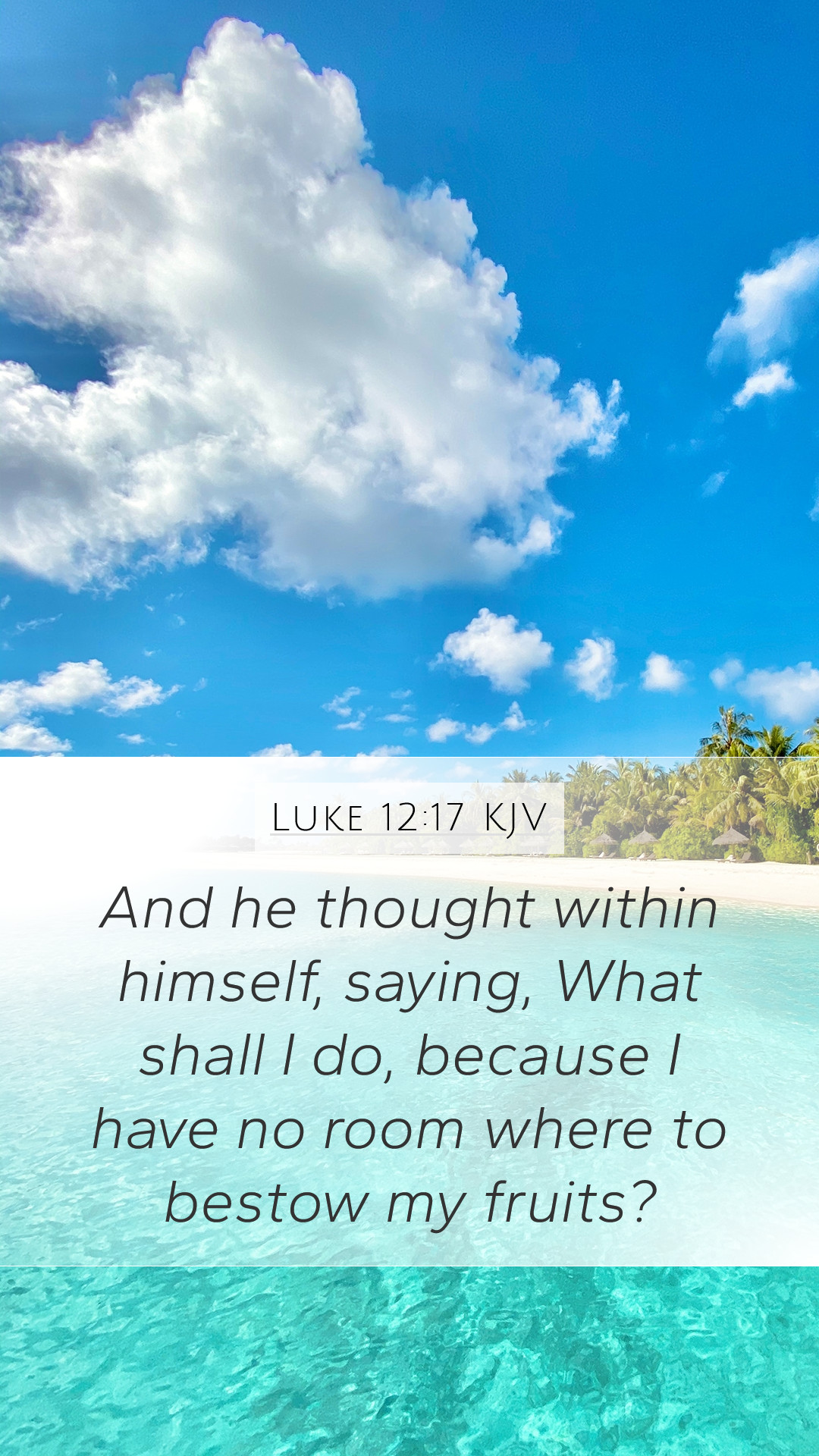Bible Verse Meaning and Commentary on Luke 12:17
Verse: Luke 12:17 - "And he thought within himself, saying, What shall I do, because I have no room where to bestow my fruits?"
This verse captures an internal struggle regarding wealth and material possessions. The man, presumably prosperous, faces a dilemma of what to do with his abundant harvest. He reflects inwardly, indicating a personal contemplation that leads to important implications on greed and selfishness.
Insights from Commentaries
- Matthew Henry:
Matthew Henry emphasizes the folly of focusing exclusively on earthly treasures. The rich man’s introspection reveals his fixation on material wealth, which blinds him to the more significant spiritual needs of life. Instead of sharing his abundance, he plans to hoard it, which warns readers about the dangers of greed and neglecting divine purposes.
- Albert Barnes:
Albert Barnes notes that the man's question reflects a self-centered attitude. He is concerned not just about his possessions but about increasing them at the cost of others’ needs. Barnes highlights the contrast between earthly concerns and heavenly priorities, suggesting that hoarding wealth leads to spiritual emptiness.
- Adam Clarke:
Adam Clarke delves into the implications of this verse on social responsibility. He indicates that this predicament illustrates a broader human experience where individuals must confront their priorities. Clarke argues that true richness comes from generosity and spiritual fulfillment rather than merely accumulating wealth without purpose.
Understanding the Significance of Luke 12:17
The significance of this verse extends beyond a mere account of a man's wealth; it embodies the broader teaching of Jesus regarding the right attitude towards wealth and possessions. Here are some key takeaways:
- Introspection: The soliloquy of the rich man indicates the importance of self-reflection. In contemplating his riches, he neglects to consider others and the eternal purpose behind wealth.
- Materialism's Pitfalls: The passage warns against the societal inclination towards materialism. The man’s desire to contain his wealth leads to questions about whether he truly recognizes the temporary nature of earthly goods.
- Selfishness vs. Generosity: The narrative juxtaposes selfish accumulation against the Christian ideal of sharing and caring for others. It prompts readers to evaluate their own lifestyles and priorities in regards to their resources.
Application of Luke 12:17 in Daily Life
The teachings found in Luke 12:17 can be applied in several ways:
- Consider how you allocate your resources – are you prioritizing what benefits yourself over what benefits the community?
- Engage in discussions about financial stewardship and the ethical implications of wealth in Bible study groups.
- Utilize online Bible study tools to explore similar passages that challenge prevailing attitudes about material possession.
Related Bible Cross References
- Matthew 6:19-21: “Lay not up for yourselves treasures upon earth...”
- 1 Timothy 6:17-19: “Charge them that are rich in this world, that they be not high-minded...”
- James 5:1-3: “Go to now, ye rich men, weep and howl for your miseries that shall come upon you.”
Conclusion
In conclusion, Luke 12:17 serves as a powerful reminder of the dangers of materialism and the importance of introspection regarding our possessions. The insight derived from public domain commentaries enriches our understanding of this scripture, urging us toward a life of generosity rather than greed. In studying such verses, we gain valuable Bible verse explanations that contribute to our overall Bible study insights and enhance our understanding of Scripture.


